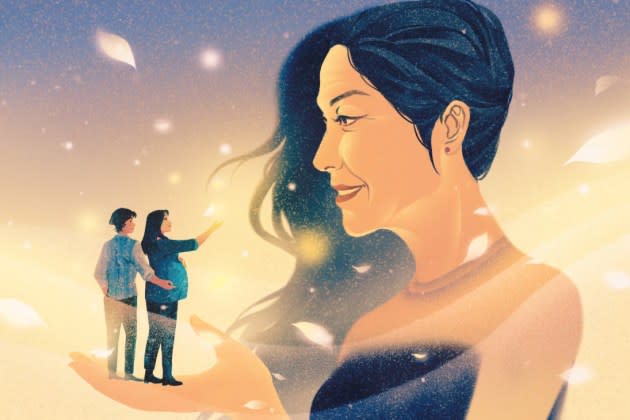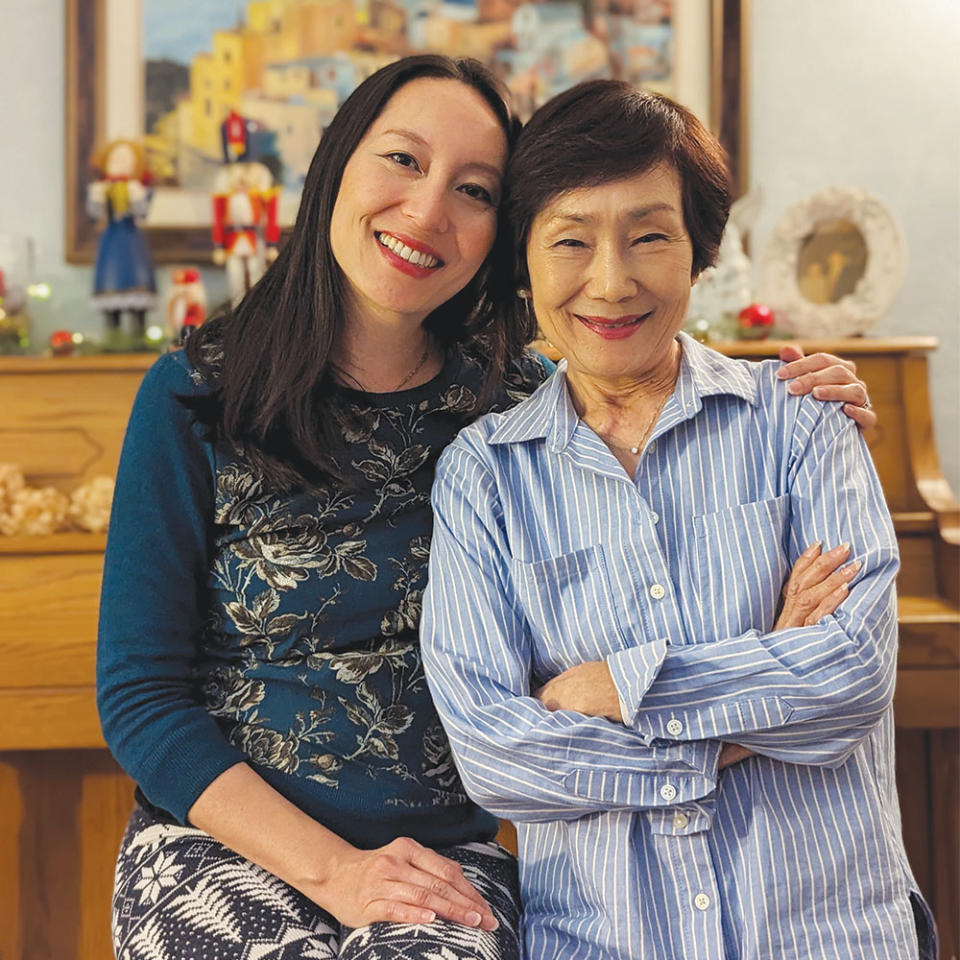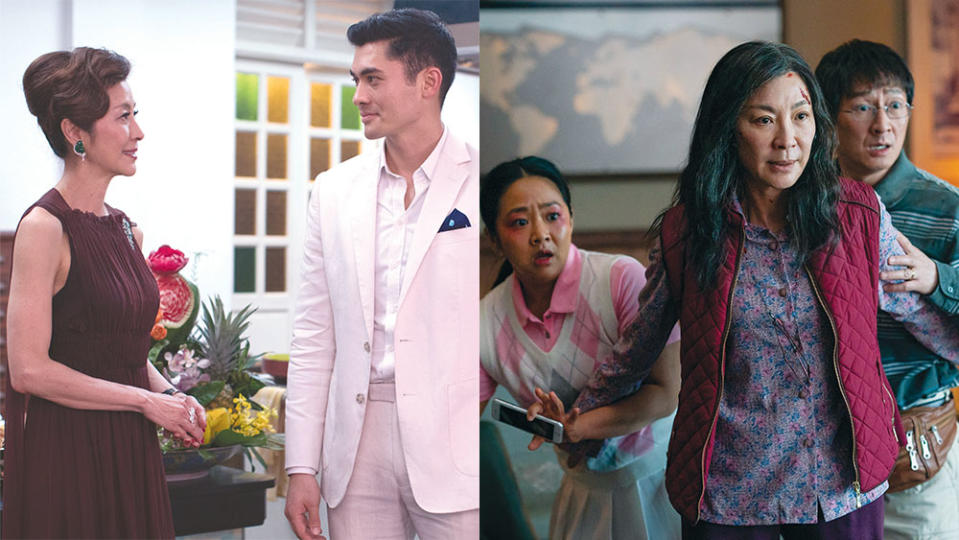What Michelle Yeoh Taught Me About Motherhood

At a stage that for most actresses signals the beginning of the end, it’s perhaps no accident that Michelle Yeoh is reaching even higher heights, 40 years into her career. There’s something about Yeoh as Mother that transcends, in every shading and variation: cool and elegant in Crazy Rich Asians, imperious and twisted in Star Trek: Discovery, harried and bewildered in Everything Everywhere All at Once. In every version she is elementally familiar, particularly to my generation. She resembles the mother we have or the one we want, the kind we fear or crave, or both.
Four years ago, after I got engaged initially without my parents’ blessing, I wrote about how Crazy Rich Asians brought painful clarity to my own standoff, caught between romance and family. Much of my epiphany was fueled by Yeoh’s exquisite portrayal of Eleanor Young — her unyieldingly lofty standards for her child’s welfare, and the child’s realization that there could be no happy ending without her as part of it. When I interviewed Yeoh for THR‘s 2018 cover story on the film, she told me she only took the role once assured that it would not play into one-dimensional stereotypes. In less capable and intuitive hands, Eleanor would be the story’s easy villain. Instead, when I took my parents to see the film on opening weekend, my mom left the theater raving about the character’s wisdom and strength and (to my chagrin at the time) found validation in their shared perspective. EEAAO‘s downtrodden laundromat owner Evelyn Wang couldn’t be more different from one-percenter Eleanor, but in her tenacity and insistence on chasing her daughter to the ends of the multiverse — chasms of culture and generations and literal rocks be damned — I saw yet another dimension of my dynamic with my mother playing out onscreen.
More from The Hollywood Reporter
'Barbie,' 'Oppenheimer' Among Most Googled Movies Globally in 2023
Where to Stream Oscar-Winning Film 'Everything Everywhere All at Once' Online for Free
Both my mom and Yeoh exude a formidable presence that belies their petite stature, and although I’ve never witnessed the former deliver a literal beatdown to anyone, she has always been fearless in a confrontation and wields words as skillfully as a swordswoman does her saber. Her fortitude, both physical and mental, is superhuman, a 90-pound septuagenarian devoting her retirement years to caregiving for my father, who has Parkinson’s. Despite that work’s punishing demands, she has not sacrificed her style and qi zhi — a refined, graceful temperament — a quality that Yeoh, even as frumpy Evelyn, also radiates. Neither woman has ever been caught dead in a short, curly Asian mom perm.
In Yeoh’s portrayals, exacting expectations — whether a devastatingly deployed “You will never be enough” or a clumsily blurted “You are getting fat” — are contextualized as springing forth from a deep, nearly inexpressible reservoir of love and concern for one’s child. She does justice to real Asian mothers, portraying characters who serve as reparations for the racist, maligning damage that Amy Chua’s Tiger Mom trope has implanted in the American imagination.
Last year, I seized the opportunity to pitch a feature long on my bucket list: a cover profile of Yeoh, one that would explore the woman behind the legend. She’d long been a fixture in Asian news media, but at the time I had read little of her personal life in Western articles. In particular, I was curious about her ability to channel, with such uncanny precision and authenticity, the complex and sometimes paradoxical qualities of our own real-life mothers. A quick web search confirmed that she has no biological or adoptive children of her own, and a deeper crawl through old clips surfaced references to that being a matter of fate not choice.
Another reason for my fixation with the motherhood angle is that I’d learned last January that I was pregnant. Although the pregnancy was welcome news for my husband and me, suddenly being faced with the impending reality of a new identity ushered new anxieties to the surface. “I don’t know how to be a mom! I barely know how to take care of myself,” I wailed one night, huddled next to my mother in her bed during a visit home one weekend. She spooned her tiny body around mine as she reassured me that, like all women, I would rise to the occasion when the time came.
The day before my interview with Yeoh, I had my first ultrasound appointment. A technician swept me with a probe as an image of my uterus — silent and still as a tomb — popped up on the monitor. “There’s a lot of blood,” she said, pointing to the cloudiness onscreen. My OB said I could take a week to decide whether to go the medical or surgical route (and this was February 2022, four months before I fully realized what a blessing it is to live in California, where such potentially life-saving options remain available). On our way out, I felt like apologizing to everyone in the clinic for my perceived failure.
I never made it back there with my decision. A few days later, my brother called at 2:30 in the morning: “Mom had an accident.” She had spoken of increased dizziness over the past week, which we all chalked up to the strain of solo caregiving. Apparently she had gotten up in the middle of the night, lost her balance and struck her head hard on some furniture. Her second call was to 911. The first was to my brother, to tell him to come over and stay with my dad so that he wouldn’t wake up in the morning frightened and alone.
My husband, Mike, and I arrived in Orange County at 4 a.m. My mother was already at the hospital, a few drops of blood in the doorway leaving a telltale trace of where she had been wheeled out by the paramedics. For the next week, Mike lived mostly in the kitchen, prepping, serving and cleaning up after my father’s meals, while I was on nurse duty, getting him out of bed, showered, dressed and shuttled around the house. At night, I lay in my mother’s bed soundlessly mouthing a desperate prayer to the heavens: “Not like this, God. Don’t take her like this.”

During that time, I experienced occasional cramping that felt like my body attempting to turn itself inside out. One afternoon, I passed my embryo in the restroom. Mike and I stared silently into the bowl, wondering if the worst was over. I fished out the mass (we were afraid of clogging the toilet if we flushed it), wrapped it in a bag and left it on the floor of the garage, next to the recycling. When I went back later to check on laundry, Mike followed and we clung to each other and finally sobbed, our dashed hopes wadded up in bloody tissue on the concrete a few feet away. We stole fleeting seconds of private grief before domestic duties again called, and I wondered if this was what it was to be a parent: sublimating oneself in service of others, finding reserves of strength to do what needs to be done.
After my mother was discharged with six staples in her head, the challenge became restraining her from getting back to household chores right away. Mike returned to L.A. for work, and I attempted to multitask remotely, ostensibly reporting the Yeoh story from my parents’ kitchen table but in reality spending my days managing health care and researching long-term caregiving options. (Daniels, EEAAO‘s directors, graciously rescheduled after I ghosted them during our originally slated interview.)
Over the next couple of weeks, my feature story slowly came together, mostly at night as I typed away on the futon in my parents’ study. Revisiting Yeoh’s stunt-work-inflicted close call with permanent injury and death in the late ’90s, I thought about my mother in the next room, determined to heal her body and live another day. But what was most revelatory for me was relating to Yeoh myself. For the first time, I saw her not just as a mother figure but as a woman who had to reconcile her own hopes with reality, who wanted to be a mother and fully pursued every means to that dream. In her I found comfort and solidarity, and alongside my friends’ and other women’s courageous disclosures of their fertility journeys, I could grieve my failed pregnancy without entertaining thoughts of shame.
“I love kids. I really wanted to have a family, but unfortunately that did not smile upon me,” Yeoh told me during our interview. “It’s tough when every month … this is the one thing I want. We were doing all those [fertility treatments]. As women, up to a certain age, you can do it. Then, you have to at some point accept reality.”

I couldn’t help but feel grateful yet apologetic that this particular universe, in denying Yeoh her personal desire, transformed her into a conduit of motherhood not only to those directly touched by her maternal nature — she is “Mama Michelle” or “Popo Michelle” to her goddaughter’s child, friends, family and colleagues — but also to generations of strangers who have found comfort and resonance in her portrayals of motherhood. “She has a very familial energy,” EEAAO co-writer/director Daniel Kwan told me. “She’s very nurturing and can transplant herself in any situation and she’s suddenly the auntie or the mom taking care of everyone.”
It feels unfair to ask any woman, even an internationally famous movie star who has agreed to an on-the-record interview, to share such a specific and personal pain as infertility, so I briefly told Yeoh about my own experience, just to make the exchange feel more like a conversation between fellow humans.
“But you are still …?” asked Michelle Yeoh, ever the nurturer.
I nod. “We’re still trying.”
“That’s good. I think you have to try until you can’t.”
And I did. Around Thanksgiving, both of my parents got COVID, so Mike and I again relocated to Orange County for a few weeks. It was a mirror bookend to the beginning of the year, with a few significant differences. This time, we were more practiced at working together as care providers — and I was accompanied by a new presence, one with a strong heartbeat and an equally strong kick. As Yeoh makes history with her Oscar nomination for EEAAO, I am now in my third trimester. I know firsthand that the future holds no guarantees. But if I’ve learned nothing else this past year from the strong women in my life — the sorority of infertility and pregnancy loss, our communal mother Michelle Yeoh, my own mom — it’s that you keep trying while you can. And even if you reach the limits of time and your physical body, being a mother is so much more than a biological capacity. It’s a posture — one of persevering, generous love.
This story first appeared in the March 8 issue of The Hollywood Reporter magazine. Click here to subscribe.
Best of The Hollywood Reporter

 Yahoo News
Yahoo News 
